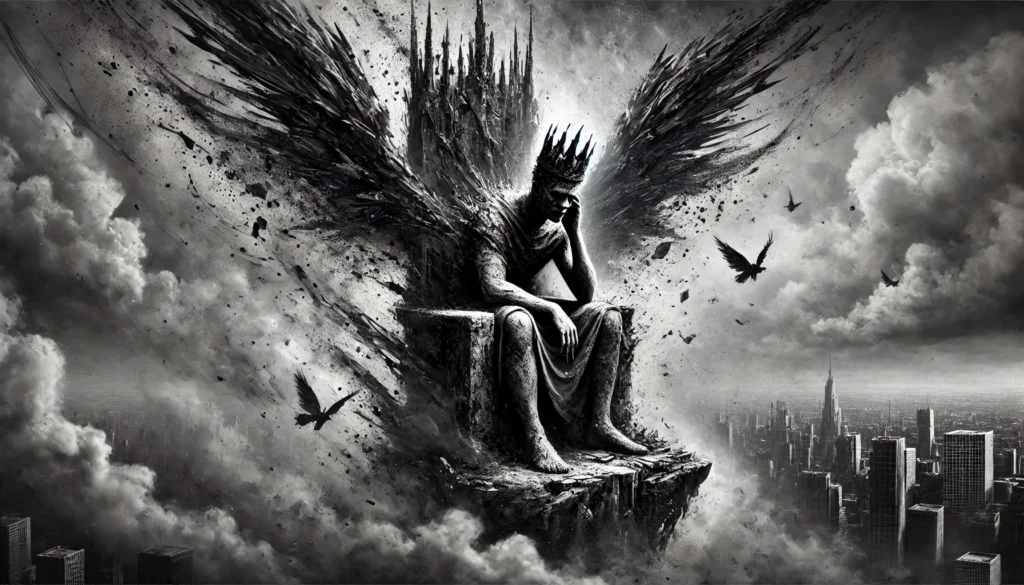In the grand tapestry of ancient Greek literature, Aristophanes’ The Birds stands out as a brilliant and whimsical satire that continues to resonate with readers and audiences alike. First performed in 414 BCE at the City Dionysia, this comedic play is more than just a simple flight of fancy—it’s a sharp critique of human nature, politics, and the eternal pursuit of utopian ideals. Aristophanes, with his characteristic wit and irony, crafts a narrative that is both playful and profound, inviting us to question our own desires for a perfect world.
A Flight to Nowhere
The story begins with two disillusioned Athenians, Pisthetaerus and Euelpides, who are fed up with the corrupt and chaotic state of Athens. Seeking peace and tranquility, they decide to abandon the city and search for Tereus, a mythical king who was transformed into a hoopoe, a bird known for its exotic plumage and melodious song. Tereus now resides in a far-off land, living among the birds. The two men, armed with a map that is as dubious as their intentions, embark on a journey that is as much a physical trek as it is an exploration of the human psyche.
Upon meeting Tereus, Pisthetaerus hatches an audacious plan: the creation of a new city in the sky, aptly named Cloudcuckooland. This utopian society, suspended between heaven and earth, will serve as a middle ground between gods and men, effectively placing the birds—under human guidance—in a position of supreme power. The irony here is palpable. Aristophanes is not merely mocking the Athenians’ desire to escape their flawed reality; he is also critiquing the very notion of utopia itself. By building their perfect city in the clouds, Pisthetaerus and Euelpides are literally chasing an illusion, a dream that is as insubstantial as the air on which it floats.
The Birds: A Motley Chorus
One of the most enchanting aspects of the play is its chorus, composed entirely of birds. These creatures, each with their unique characteristics and voices, represent a microcosm of society. Aristophanes, in his typical style, imbues the birds with anthropomorphic qualities, allowing them to voice their opinions, fears, and aspirations. The birds are initially wary of Pisthetaerus’ plan, fearing that the humans might exploit them as they have done with other animals. However, they are eventually persuaded by the prospect of power and immortality.
The birds’ transformation from skeptical bystanders to eager participants in Pisthetaerus’ scheme serves as a satirical commentary on human nature. Like the birds, people are often swayed by grand promises and the allure of power, even if those promises are built on flimsy foundations. Aristophanes uses the birds to highlight the folly of following charismatic leaders without questioning their motives or the feasibility of their plans.
A Utopian Illusion
As Cloudcuckooland begins to take shape, the play delves deeper into the absurdity of the utopian dream. Aristophanes spares no one in his critique. The gods, outraged by the construction of this new city that threatens their supremacy, send envoys to negotiate with Pisthetaerus. The negotiations, however, are less about divine power and more about mundane desires. Pisthetaerus, ever the shrewd politician, manipulates the gods into granting him more and more concessions, eventually securing a marriage with Zeus’s daughter, Basileia, a symbol of ultimate power.
The irony here is delicious. In their quest to create a perfect society, Pisthetaerus and the birds end up replicating the very flaws and corruptions they sought to escape. Cloudcuckooland, rather than being a utopia, becomes a mirror of the flawed human world, complete with power struggles, deceit, and ambition. Aristophanes is not just mocking the idea of utopia; he is also critiquing the human tendency to repeat the same mistakes, even when given a blank slate.
The Satirical Edge
What makes The Birds particularly compelling is its satirical edge. Aristophanes uses humor to expose the absurdities of human nature and society. The play is filled with witty dialogues, playful banter, and ironic twists that keep the audience engaged while simultaneously delivering a biting critique of the very notion of a perfect society. The humor is not just for entertainment; it serves as a tool for reflection, forcing the audience to confront the realities of their own world.
Aristophanes’ satire extends beyond the specific context of ancient Athens. The play touches on universal themes that remain relevant today: the desire for power, the illusion of utopia, and the inherent flaws of human nature. In The Birds, we see a reflection of our own society, with its constant search for a better world, often at the expense of reality. Aristophanes reminds us that the pursuit of perfection is not only futile but also potentially dangerous, as it can lead to the same power struggles and corruptions that plague the world we seek to escape.
The Playful Irony
The tone of The Birds is delightfully ironic. Aristophanes plays with the audience’s expectations, leading them to believe that the creation of Cloudcuckooland might actually succeed. However, as the play progresses, it becomes clear that the utopian dream is nothing more than a whimsical fantasy. The irony is further amplified by the fact that Pisthetaerus, who starts as a simple citizen looking for peace, ends up as a tyrant, ruling over both gods and men. The play’s conclusion, where Pisthetaerus marries Basileia and assumes ultimate power, is a masterstroke of irony, showing how easily the quest for a better world can devolve into the same old power dynamics.
Aristophanes’ use of irony serves as a powerful critique of the political and social systems of his time. The play was written during a period of great political upheaval in Athens, with the city embroiled in the Peloponnesian War and facing internal strife. The Athenians, like the characters in The Birds, were searching for solutions to their problems, often turning to demagogues who promised to create a better society. Aristophanes, through his ironic lens, warns against the dangers of such blind faith in utopian visions.
Conclusion: A Timeless Satire
The Birds by Aristophanes is more than just a comedic play; it is a timeless satire that explores the complexities of human nature and the futility of utopian ambitions. Through his playful and ironic tone, Aristophanes invites us to laugh at the absurdity of the characters’ quest while also reflecting on the deeper truths about society and politics. The play’s enduring appeal lies in its ability to entertain while simultaneously challenging our assumptions about the world.

In the end, The Birds is a reminder that the pursuit of a perfect society is as elusive as the birds themselves—always just out of reach, forever flying beyond the grasp of human hands. And perhaps, Aristophanes suggests, that is exactly as it should be. After all, it is in the striving, the dreaming, and the inevitable falling short that we find the true essence of the human experience. The Birds remains a playful yet poignant commentary on our eternal quest for something better, and the irony that often, what we seek is already within us, waiting to be discovered amidst the imperfections of our own world.

